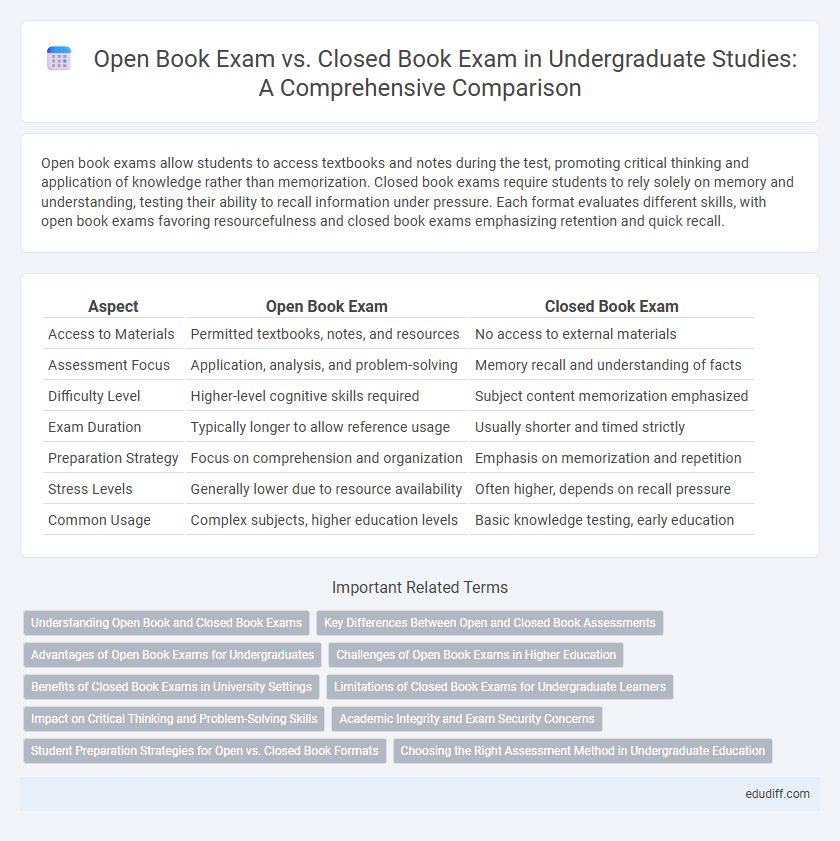Open book exams allow students to access textbooks and notes during the test, promoting critical thinking and application of knowledge rather than memorization. Closed book exams require students to rely solely on memory and understanding, testing their ability to recall information under pressure. Each format evaluates different skills, with open book exams favoring resourcefulness and closed book exams emphasizing retention and quick recall.
Table of Comparison
| Aspect | Open Book Exam | Closed Book Exam |
|---|---|---|
| Access to Materials | Permitted textbooks, notes, and resources | No access to external materials |
| Assessment Focus | Application, analysis, and problem-solving | Memory recall and understanding of facts |
| Difficulty Level | Higher-level cognitive skills required | Subject content memorization emphasized |
| Exam Duration | Typically longer to allow reference usage | Usually shorter and timed strictly |
| Preparation Strategy | Focus on comprehension and organization | Emphasis on memorization and repetition |
| Stress Levels | Generally lower due to resource availability | Often higher, depends on recall pressure |
| Common Usage | Complex subjects, higher education levels | Basic knowledge testing, early education |
Understanding Open Book and Closed Book Exams
Open book exams allow students to access textbooks, notes, and other resources during the test, encouraging application and critical thinking rather than rote memorization. Closed book exams require students to rely solely on memory and internalized knowledge, testing recall and comprehension under timed conditions. Both formats assess understanding differently, with open book exams emphasizing resourcefulness and closed book exams emphasizing mastery of material.
Key Differences Between Open and Closed Book Assessments
Open book exams allow students to access textbooks, notes, and other resources during the test, promoting application and critical thinking skills rather than memorization. Closed book exams require students to rely solely on memory, testing recall and understanding without external aids. The primary difference lies in the assessment focus: open book exams evaluate problem-solving and analysis, while closed book exams emphasize content retention and quick recall.
Advantages of Open Book Exams for Undergraduates
Open book exams enhance critical thinking and problem-solving skills by allowing undergraduates to apply knowledge rather than memorize facts. They reduce exam anxiety and promote deeper understanding by encouraging students to explore resources and reference materials during the test. These exams better simulate real-world scenarios where information is accessible, fostering practical learning and long-term retention.
Challenges of Open Book Exams in Higher Education
Open book exams in higher education present challenges such as increased preparation time due to the necessity of thorough understanding rather than memorization and the difficulty in designing questions that effectively assess critical thinking rather than resource-finding skills. Students may struggle with time management when navigating materials during the exam, and academic integrity concerns arise as open book formats can complicate monitoring for unauthorized collaboration. These factors require educators to develop innovative assessment strategies to ensure open book exams accurately measure learning outcomes.
Benefits of Closed Book Exams in University Settings
Closed book exams in university settings promote deeper learning and critical thinking by requiring students to internalize and apply core concepts without relying on external materials. These assessments enhance academic integrity by reducing opportunities for cheating and ensure students master foundational knowledge essential for advanced coursework. Furthermore, closed book exams better prepare students for real-world scenarios where recall and problem-solving skills are imperative under time constraints.
Limitations of Closed Book Exams for Undergraduate Learners
Closed book exams limit undergraduate learners' ability to access external resources, which can hinder the demonstration of critical thinking and real-world problem-solving skills. This exam format often emphasizes memorization over comprehension, reducing the opportunity for students to engage deeply with the subject matter. The pressure of recalling information without reference materials can increase anxiety and negatively impact academic performance.
Impact on Critical Thinking and Problem-Solving Skills
Open book exams encourage students to develop critical thinking and problem-solving skills by requiring analysis and application of information rather than rote memorization. Closed book exams assess the ability to recall facts quickly, often emphasizing memory over deeper comprehension. Research shows that open book formats promote higher-order thinking by challenging students to synthesize knowledge and reason through complex problems under time constraints.
Academic Integrity and Exam Security Concerns
Open book exams can challenge academic integrity by increasing risks of unauthorized collaboration and access to unapproved materials, requiring robust monitoring and strict guidelines to maintain exam security. Closed book exams limit access to external resources, reducing opportunities for cheating but can induce higher stress levels that may affect student performance and fairness. Balancing exam security with authentic assessment demands tailored strategies such as randomized questions and secure digital platforms to uphold integrity in both exam types.
Student Preparation Strategies for Open vs. Closed Book Formats
Students preparing for open book exams focus on organizing course materials, creating concise notes, and practicing application of concepts rather than memorization. In contrast, closed book exam strategies emphasize intensive memorization, repeated practice tests, and time management to recall information quickly. Effective preparation for both formats involves adapting study methods to the exam's access to resources and assessment style.
Choosing the Right Assessment Method in Undergraduate Education
Selecting the ideal assessment method in undergraduate education hinges on evaluating the learning objectives and skill sets to be measured. Open book exams foster critical thinking and application of knowledge by allowing access to resources, while closed book exams emphasize memorization and quick recall of information. Balancing these formats based on course goals enhances student engagement and effectively gauges comprehension.
Open Book Exam vs Closed Book Exam Infographic

 edudiff.com
edudiff.com